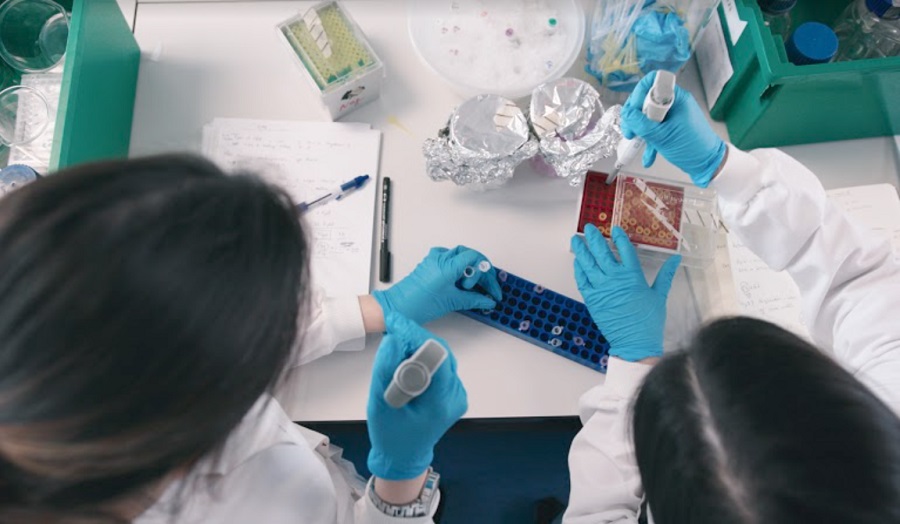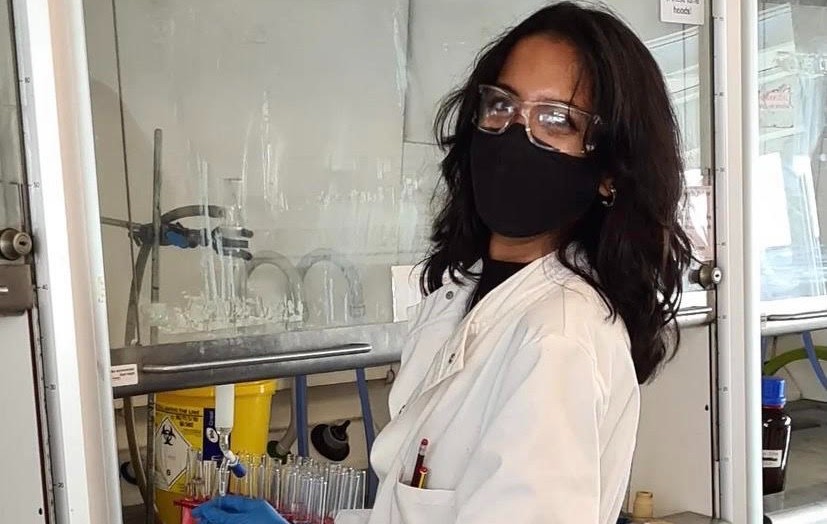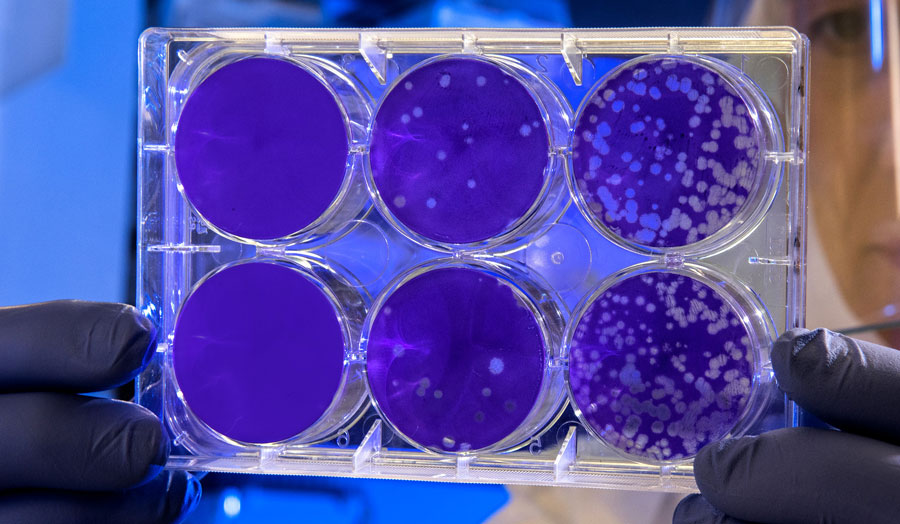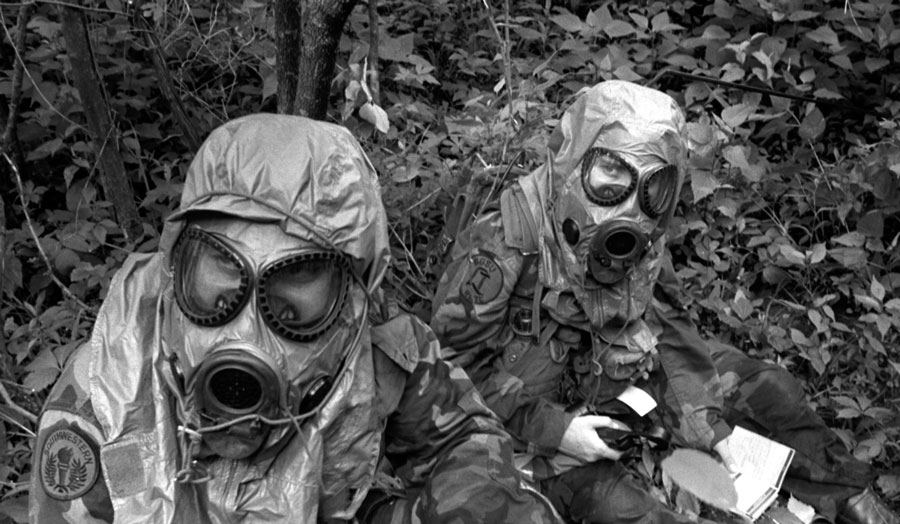Apply for this course
Please select when you would like to start:
If you're a UK applicant wanting to study full-time starting in September, you must apply via UCAS unless otherwise specified. If you're an international applicant wanting to study full-time, you can choose to apply via UCAS or directly to the University.
If you're applying for part-time study, you should apply directly to the University. If you require a Student visa, please be aware that you will not be able to study as a part-time student at undergraduate level.
Why study this course?
More than an introduction to the fundamentals, this chemistry degree provides intensive basic training that is designed to give you the core laboratory, IT and performance skills to succeed in your chosen career.
You'll be taught in our £30 million Science Centre, which has more than 280 cutting-edge work stations. This impressive space allows multiple practical lessons to take place simultaneously, with headphones and computers at each station to allow your teachers to speak directly to you as you carry out experiments. This facility will give you experience of working with technologies that are used in industry settings, preparing you for a wide range of roles on graduation.
The course is accredited by the Royal Society of Chemistry and provides partial exemption from the academic requirements for Chartered Chemist status.
Accredited by the RSC
The course is accredited by the Royal Society of Chemistry (RSC) and provides partial exemption from the academic requirements for Chartered Chemist status
Gain key experience from experts and placements
Our lecturers are often industry experts or active researchers and there are opportunities for on-the-job experience through our work placement scheme
Make use of our state-of-the-art resources
You'll be taught in our £30 million Science Centre, which has more than 280 cutting-edge work stations, offering hands-on practical experience and knowledge of analytical techniques such as UV and infrared spectroscopy
Course modules
The modules listed below are for the academic year 2024/25 and represent the course modules at this time. Modules and module details (including, but not limited to, location and time) are subject to change over time.
Year* 1 modules
Year 2 modules
Year 3 modules
Foundations of Physics
This module currently runs:autumn semester - Monday afternoon
(core, 15 credits)
The module provides an introduction to key topics of Physics relevant to Chemistry and the Natural Sciences including classical mechanics, waves and vibrations, quantum mechanics, electrostatics, electromagnetism, optics and atomic spectroscopy. It gives an appreciation of the importance of modelling physical systems mathematically in order to predict the behaviour of chemical or biological systems.
Read full detailsFundamental Chemical Concepts
This module currently runs:autumn semester - Monday morning
(core, 15 credits)
This module covers the fundamental concepts of inorganic/physical chemistry and mathematics needed as a foundation for students studying Chemical and Pharmaceutical Sciences. Students will undertake practice problem solving skills based on the material taught.
The aim of this module is to ensure you will develop key skills and knowledge in:
1. fundamental mathematical principles
2. key concepts of bonding and molecular shape
3. some aspects of the descriptive chemistry of the elements and your exposure to introductory concepts in physical chemistry
This module aims to provide you with the qualities and transferable skills necessary for employment requiring the exercise of some personal responsibility and mathematical competence.
Fundamentals of Molecular Biology (for Life Sciences)
This module currently runs:spring semester - Monday afternoon
(core, 15 credits)
The aims of this module are aligned with the qualification descriptors within the Quality Assurance Agency’s, Framework for Higher Education Qualification. This module aims to provide an overview of the organisation, expression, and replication of genetic information in prokaryotes and eukaryotes together with principles of Mendelian inheritance; examine the consequences of mutation on gene expression together with an introduction to techniques of gene analysis and manipulation. This module aims to provide students with the qualities and transferable skills necessary for employment requiring the exercise of some personal responsibility.
Read full detailsGeneral Chemistry
This module currently runs:autumn semester - Thursday morning
(core, 15 credits)
The aims of this module are aligned with the qualification descriptors within the Quality Assurance Agency’s Framework for Higher Education Qualification. The module provides an introduction to core aspects of chemistry - concepts of naming and drawing chemical formulae, organic bonding, differing types of isomerism, moles, reaction processes, states of matter, and interactions between particles are enumerated. Students will undertake regular tests based on the material taught.
Read full detailsIntroduction to Laboratory Skills
This module currently runs:autumn semester - Thursday afternoon
(core, 15 credits)
The module will introduce students to safe working practices in the laboratory environment (GLP), simple chemical techniques and laboratory record keeping also in keeping with GLP.
The aim of this module is to ensure that you will develop key skills and knowledge that will enable you:
- to be familiar with the laboratory environment and to develop basic lab practice: personal safety, awareness of others;
- to familiarise yourself with writing a scientific report: contemporary scientific record keeping, style, recording data, interpreting data and drawing appropriate conclusions from results;
- to carry out basic lab procedures safely – handling and assembly of ‘quickfit’ apparatus; handling, purification and routine analysis of chemicals;
- to be familiar with the learning resources and support facilities available within the Learning Centre that will assist you with your personal and professional development;
- to develop transferable skills that will enable you to derive maximum benefit from your chosen course of study.
Introduction to Organic Chemistry
This module currently runs:spring semester - Thursday morning
(core, 15 credits)
The module is concerned with the fundamental and basic chemical concepts within the context of Organic Chemistry and starts to develop the more specialist knowledge of organic reactions required for later modules of organic chemistry.
The aim of this module is to ensure you will develop key skills and knowledge in:
1. understanding organic chemistry nomenclature.
2. identifying the types of reactions that are taking place.
3. recognising how reaction mechanisms work.
4. developing synthetic routes to simple structures.
Key Principles in Chemistry
This module currently runs:spring semester - Monday morning
(core, 15 credits)
This module covers inorganic and physical chemistry needed for students studying Chemical and Pharmaceutical Sciences. Students will undertake an assessed practical and practice problem solving skills based on the material taught.
The aim of this module is to ensure you will develop key skills and knowledge in:
1. inorganic chemistry, including the p-block, transition metal chemistry and magnetism.
2. essential physical chemistry topics of thermodynamics and electrochemistry
This module aims to provide students with the qualities and transferable skills necessary for employment requiring the exercise of some personal responsibility and enhancing analytical skills
Laboratory Techniques with Data Handling
This module currently runs:spring semester - Thursday afternoon
(core, 15 credits)
This module further develops the practical abilities of the student and the ability to record and process increasingly complex data. The module reinforces the importance of an appreciation of the theoretical principles underlying the procedures that will be investigated in the laboratory and in workshops. Students will also be expected to reflect on their personal and professional development throughout this module.
The aim of this module is to ensure that you will develop key skills and knowledge that will enable you to:
- enhance your practical skills in the areas of synthesis, purification and characterisation of products;
- enhance your skills in data recording, processing and appropriate analyses of laboratory results;
- understand the concepts that are associated with a variety of analytical processes routinely used in a laboratory;
- to be more aware of the parameters that govern chemical processes (on small and large scales).
Coordination and solution chemistry of d and f block complexes
This module currently runs:autumn semester - Wednesday morning
(core, 15 credits)
The module aims to develop an understanding of the relationships between structure, bonding and reactivity of metal compounds and complexes in the d- and f- block. The knowledge gained will give students an understanding of the solution characteristics of complexes and give them the knowledge to predict properties of example complexes. It will also bring real world examples of metals in medicine and the properties that make them important in therapy of patients. The practical aspects of the module will enable students to acquire skills and experience of preparative, analytical and instrumental methods which are essential to inorganic chemistry. The module offers students from other related BSc degrees to increase their knowledge of inorganic chemistry. Inorganic chemistry is a key discipline, it builds and reaffirms, whilst allowing students to appreciate the whole of the periodic table. The module is assessed via a poster and exam giving students the opportunity to display content and discuss their findings in a verbal manner whilst also displaying concise written scientific information in an attractive manner.
Read full detailsKinetics and Surface Chemistry
This module currently runs:autumn semester - Tuesday morning
(core, 15 credits)
This module aims to develop the students’ knowledge and understanding of two major areas of physical chemistry and give an appreciation of the importance of modelling physicochemical processes mathematically in order to be able to predict the behaviour of chemical systems. The module will examine key theories and applications of chemical kinetics and surface chemistry. Additionally, the module aims to provide students with the qualities and transferable skills necessary for employment by demonstrating initiative and personal responsibility. Taught sessions will highlight related, impactful research from a diverse body of scientists.
Read full detailsOrganic Ring Systems
This module currently runs:spring semester - Tuesday afternoon
(core, 15 credits)
This module relates the physical and chemical behaviour of polyfunctional cyclic organic compounds and biomolecules to their structures and electronic properties. Taught classes will be reinforced by practical exercises and spectroscopic problems.
Read full detailsOrganic Unsaturated Molecules
This module currently runs:autumn semester - Tuesday afternoon
(core, 15 credits)
This module relates the physical and chemical behaviour of polyfunctional acyclic organic compounds and biomolecules to their structures and electronic properties. Taught classes will be reinforced by practical exercises and spectroscopic problems
Read full detailsQuantitative Analysis
This module currently runs:autumn semester - Wednesday afternoon
(core, 15 credits)
Description: This module will develop problem solving and report writing skills in qualitative analytical chemistry and will enable students to identify analytical substrates on the basis of combined analytical results from a variety of sources. Key areas to be explored are principles of analysis, chromatographic separation techniques, and electroanalysis. The aims of this module are aligned with the qualification descriptors within the QAA’s the Quality Assurance Agency’s, Framework for Higher Education Qualifications.
Read full detailsSolid State and Organometallic Chemistry
This module currently runs:spring semester - Wednesday morning
(core, 15 credits)
The module aims to develop an understanding of the relationships between structure and bonding in organometallic complexes and the 18 electron rule. Solid state characterisation will also be taught showing how it is a powerful tool to understand crystal lattice systems. The practical aspects of the module will enable students to acquire skills and experience of preparative, analytical and instrumental methods which are essential to inorganic chemistry. The module offers students from other related BSc degrees to increase their knowledge of inorganic chemistry. Inorganic chemistry is a key discipline throughout the degrees, it builds and reaffirms whilst allowing students to appreciate the whole of the periodic table. The module is assessed via a laboratory report, a practical quiz and a summative exam giving students the opportunity to complement their lectures and taught material with laboratory learning. Laboratory work is emphasised throughout the module as a key learning objective.
Read full detailsSpectroscopic Methods
This module currently runs:spring semester - Wednesday afternoon
(core, 15 credits)
Description: This module will develop problem solving and report writing skills in qualitative analytical chemistry and to enable students to identify analytical substrates on the basis of combined analytical results from a variety of sources.
Read full detailsThermodynamics and Electrochemistry
This module currently runs:spring semester - Tuesday morning
(core, 15 credits)
This module aims to develop the students’ knowledge and understanding of two major areas of physical chemistry and give an appreciation of the importance of modelling physicochemical processes mathematically in order to be able to predict the behaviour of chemical systems. The module will examine key theories and applications of thermodynamics and electrochemistry. Additionally, the module aims to provide students with the qualities and transferable skills necessary for employment by demonstrating initiative and personal responsibility. Taught sessions will highlight related, impactful research from a diverse body of scientists.
Read full detailsAdvanced Inorganic Techniques
This module currently runs:autumn semester - Thursday afternoon
(core, 15 credits)
This module aims to enable students to develop an understanding of the relationship between structure, bonding and reactivity of organometallic and main group compounds. In addition, the module aims to develop students understanding of modern characterisation in solid state chemistry. Allied to this, the module will develop an awareness of the spectroscopic techniques available to an inorganic chemist and provide them with contexts that will allow them to develop problem solving skills in this area. In addition, the module aims to provide students with the qualities and transferable skills necessary for employment. They will be required to exercise initiative and personal responsibility, as well as decision-making in complex and unpredictable contexts.
Read full detailsAdvanced Organic Chemistry
This module currently runs:autumn semester - Thursday morning
(core, 15 credits)
Description: This module builds upon, and extends, material taught in the 2nd year, specifically in organic chemistry. It provides students with a deeper understanding of organic chemical reactivity.
Read full detailsAdvanced Physical Chemistry
This module currently runs:autumn semester - Friday morning
(core, 15 credits)
This module will enhance students’ knowledge and understanding of the major areas of physical chemistry for the life sciences and further develop their ability to model physicochemical processes mathematically in order to be able to predict the behaviour of chemical systems. The module will examine key theories and applications of thermodynamics, the kinetics of life processes, quantum theory, heterogeneous catalysis and molecular spectroscopy.
Read full detailsMedicinal Chemistry
This module currently runs:spring semester - Thursday morning
(core, 15 credits)
The aims of this module are aligned with the qualification descriptors within the Quality Assurance Agency’s Framework for Higher Education Qualifications.
This module will enable students to develop an understanding of the various strategies used in drug design and the molecular mechanisms by which drugs act in the body.
The module aims to: deepen students’ awareness of the major influence chemistry has had on the treatment of various diseases and debilitating conditions; enable students to assess critically the methodologies and strategies that govern whether or not a synthetic compound (i.e. new chemical entity, NCE) may be regarded as a good drug candidate.
Read full detailsResearch Project
This module currently runs:all year (September start) - Wednesday afternoon
(core, 30 credits)
This module will enable students to demonstrate the skills necessary to carry out a scientific programme requiring significant research. It will allow students to demonstrate the final development of their subject knowledge, skills and understanding through extended research based on laboratory, literature or field work, or meta-analysis of databases. This research will lead to the presentation of a detailed written report and a Powerpoint presentation of results. This module aims to encourage the student to reflect and build upon their subject knowledge and expertise by means of a specific investigation requiring significant research; develop the skills necessary to plan, carry out, analyse and report upon the results of an experimental or analytical programme on a scientific topic; allow the student to demonstrate that s/he has achieved a high level of personal development through working independently with the minimum necessary supervision; allow the student to demonstrate their understanding and application of safe and considerate working practices, particularly within the laboratory.
Read full detailsTopics in Inorganic Chemistry
This module currently runs:spring semester - Thursday afternoon
(core, 15 credits)
This module will introduce contemporary topics of importance in inorganic chemistry, such as supramolecular chemistry, namely catenanes and rotaxanes and host guest chemistry. Through peer reviewed journals the students will create a word board of key concepts to be discussed. Students practical skills will be enhanced by exposure to coordinating metals in motifs akin to bioinorganic chemistry. Crystallography of proteins and larger molecules will also be taught along with problem solving skills enabling them to process key data. Main group will be discussed in relation unusual bonding modes and the relationship to clusters of atoms.
Read full detailsAdvanced Bioanalytical Science
This module currently runs:spring semester - Friday morning
(option, 15 credits)
The aims of this module are aligned with the qualification descriptors within the Quality Assurance Agency’s, Framework for Higher Education Qualifications.
The module aims to develop students’ understanding of advanced bioanalytical techniques and to enable students to determine which analytical technique is suitable for a particular type of sample. The module will reinforce and build on analysis skills introduced in CH5007 and provide an opportunity for students to interpret more advanced data, particularly spectra and chromatograms and to solve defined problems. The students will gain practical experience in selected analytical techniques.
This module aims to provide students with the qualities and transferable skills necessary for employment requiring the exercise of initiative and personal responsibility and decision-making in complex and unpredictable contexts. The module should also help students to gain the learning ability needed to undertake appropriate further training of a professional or equivalent nature.
Programming for Science
This module currently runs:spring semester - Friday morning
(option, 15 credits)
The aim of this module is to provide students with an appreciation of how to use MATLAB® and how this can be applied in the sciences. Students will also gain experience at handling and analysing scientific data. Students will also learn how to plot data, have the opportunity to make GUIs (general user interfaces) and even make interactive games as a fun way to educate others about their area of scientific study. The module will be highly interactive allowing students to develop confidence in writing MATLAB scripts. The module provides students with fundamental computer programming skills which will give them the tools to use other computer programming languages such as Python and C. Students will also develop their logic and problem solving skills.
Read full detailsSandwich Placement
This module currently runs:all year (September start)
(option, 30 credits)
One year of work based learning. Work experience based full-time in an organisation with roles relevant to the academic programme of study and at an appropriate level of responsibility. Relevant organisations include; NHS, research, industrial and private medical laboratories. Learning would be driven by practical experience in the work place. Progress and development will be assessed against an agreed framework of objectives as defined in the learning agreement. For part-time students in appropriate employment they can complete the module over an extended period during their degree rather than take a year out.
The aims of this module are aligned with the qualification descriptors within the Quality Assurance Agency’s, Framework for Higher Education Qualifications.
The module aims to: Provide experience of the technical expertise, knowledge, pressures and opportunities within the context of the scientific workplace; increase awareness of the scope, structure and operation of the host organisation, from a career perspective; develop generic competencies as outlined in the registration portfolio or work based learning portfolio; maximize employability by developing the student’s ability to work (at a certain threshold level) in a professional capacity.
Read full detailsWork Placement (for Life Sciences)
This module currently runs:spring semester
autumn semester
(option, 15 credits)
Description: This module focuses on extending students' learning experience by providing them with an opportunity to tackle real-life problems, appropriate to their academic level, by undertaking a short period of professional activity in the workplace. The placement needs to be approved prior to being undertaken, by the work placement coordinator. It is expected that the student should work for 140 hours, for which they will be required to provide evidence (completed in the summer or part-time over the Autumn or Spring semester). The suitability of the opportunities will be assessed on an individual basis. Where required, students will be supported in finding suitable opportunities and with all aspects of their job search and applications. However, it is the students’ responsibility to obtain suitable employment, and roles cannot be guaranteed. DBS checks and or Hep B vaccination may be required for some placements (NHS or School-based).
This module aims to provide the student with an opportunity to: Increase their personal and professional development and gain experience of the culture and structure of a working environment; evaluate, and critically reflect on, the workplace as well as the student's role and contribution to it; and to apply previously-learnt academic knowledge to the task in hand. Explore employment options and consider future career plans. It will also ensure that suitable health and safety requirements are in place and the work activity will be approved by the module team in advance.

.jpg)

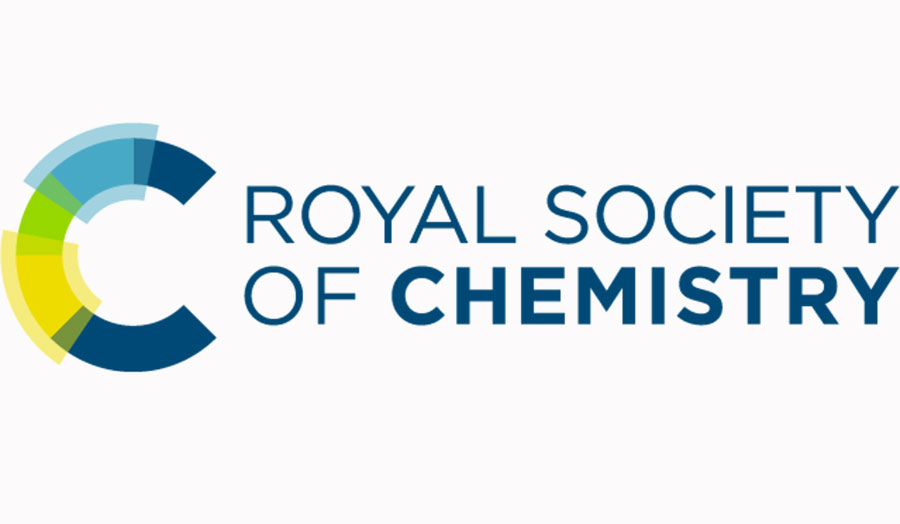
.png)
